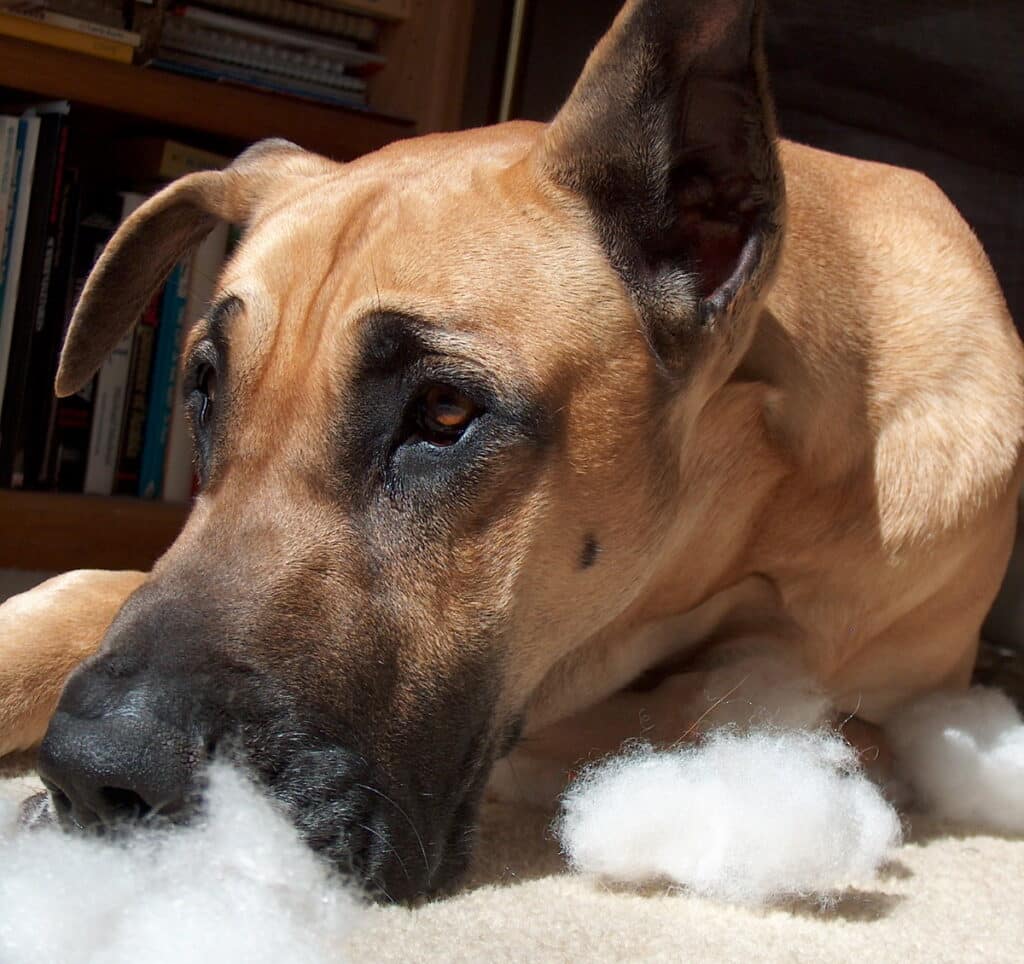Key Takeaways:
- Polyester stuffing isn’t toxic per se to our pooch friends
- Most dogs that eat stuffing are completely fine
- The biggest risk with polyester stuffing is it causing a blockage in the intestines
Coming through the holiday season, I’ve had a lot of dog’s present to me having eaten things they shouldn’t have, one of the most common of these is polyester stuffing from their new toys or bedding. If your dog has chewed through their brand new bed and there’s stuffing everywhere, don’t panic! Your dog is most likely going to be fine.
First, check that they’ve definitely eaten stuffing and remove any more in their surroundings to prevent them from eating more. The next step is to contact your veterinarian for specific advice regarding your dog. Pertinent information your dog will need to know is how much has been eaten, what size is your dog and how long since your dog ate the stuffing.
Luckily poisoning isn’t something we need to worry about as polyester stuffing is relatively inert, and small amounts can pass through the average pooch’s intestines without incident. Careful monitoring is needed, though, if a blockage occurs, then surgery needs to be performed as soon as possible to prevent the need to cut out a piece of intestine.
dogs eating polyester stuffing is a relatively common occurrence and luckily, in most cases, it passes through without incident. If you have any worries, contact your veterinarian in the first instance for specific advice for your pup.
How much is polyester stuffing toxic to dogs?
Luckily polyester stuffing isn’t absorbed through the small intestine and isn’t toxic per se to our furry friends. The primary concern if your pooch has eaten polyester stuffing is that it may cause a blockage in their intestines that necessitates surgery to remove. Polyester can also be quite irritant and cause inflammation of your dog’s stomach.
Just because there’s some stuck in their teeth doesn’t mean then they’ve eaten any of the stuffing. But if you’re sure they’ve eaten some, then take away the remaining bits to prevent them from eating anymore.
Polyester stuffing is relatively benign and doesn’t cause toxic problems in pooches. Most dogs that eat polyester stuffing pass it without any intervention.
What to do if my dog ate polyester stuffing?
The first thing to do is check that your pooch has definitely eaten some of the stuffing. Sometimes when our fur baby destroys their toy, they pull the innards out and set them aside in their search for the squeaker.
If you’re sure that your pooch has definitely eaten some of the stuffing from their bed or a toy, then the first thing to do is to make sure they can’t eat anymore, clean up any stuffing that’s around and take away the source (bed or toy). This will also give you an idea of how much they’ve consumed.
Check your dog’s mouth if it’s safe to do so to ensure they haven’t gotten any stuffing stuck in the back of their mouth, as this could pose a choking risk for your dog.
Check your dog has actually eaten the stuffing. Take any stuffing left away to prevent your dog from eating more. You can choose to monitor your dog, but I would always advise speaking with your veterinarian for specific advice the important thing to note is don’t panic!
What if my dog ate plenty of polyester stuffing but seems fine?
As toxicity isn’t the primary concern for pooches that eat toys or bed stuffing, you don’t need to panic about your pooch being poisoned. The big concerns are gastroenteritis due to inflammation from the stuffing as it passes through or a piece of stuffing becoming stuck in your dog’s intestines.
If it’s within just a couple of hours and your dog ate a large amount of stuffing, then your veterinarian will likely advise you to bring them to the clinic and induce vomiting. If it’s been longer since your dog ate the stuffing, then monitoring your dog may be the best course of action to see if they’re able to pass the stuffing.
Choking is also a rare possibility and constitutes a true emergency. If safe to do so, then you should try removing the offending piece of stuffing from the back of your dog’s throat using your fingers. Take care not to get bitten by accident! You should also contact your veterinarian for an emergency appointment.
Many dogs seem completely fine after eating toys or bed stuffing, and some may not have any indications that they ate something they shouldn’t have. For these dogs, the stuffing will likely pass through with no ill effects. Large amounts of stuffing, however, can cause a blockage or gastrointestinal inflammation so monitoring your dog for signs of discomfort is important.
Signs that my dog ate polyester stuffing
While it’s highly unlikely that your dog will be poisoned after eating some of their toy’s stuffing, it can cause inflammation of the gastrointestinal tract and even a blockage in severe cases. Some signs that your dog is developing problems after eating stuffing are:
- Choking or coughing
- Vomiting and nausea
- Tense abdomen or hunched appearance
- Diarrhea
- Loss of apdogite
- Bloating abdomen
- Whining or restlessness due to discomfort
Signs such as choking or coughing can occur almost immediately after eating stuffing, while signs such as vomiting, diarrhea, and signs of pain tend to take a few hours or even a day to develop.
What happens to dogs that eat polyester stuffing?
The vast majority of pups that swallow polyester stuffing will pass it without incident. Occasionally, some dogs will eat such a large amount that it causes gastroenteritis and your dog may suffer from vomiting and diarrhea for a short period of time. Less commonly, some stuffing causes a blockage of the intestines that necessitates surgery to remove. Even rarer situations are instances of choking, where stuffing gets stuck at the back of your dog’s mouth, blocking their airway. This is a true emergency, and the blockage needs to be resolved as soon as possible to prevent death of the pooch.
Very rarely, choking may occur, which is a true emergency, and the stuffing needs to be removed from your dog’s throat as soon as possible. Some dogs suffer from mild gastrointestinal inflammation, necessitating medical treatment for vomiting and diarrhea. Always contact your veterinarian for specific advice for your dog.
How do vets treat polyester stuffing ingestion?
Treatment for dogs that have eaten polyester stuffing will depend on a number of factors, such as:
- How long since the pooch ate the stuffing?
- How much polyester stuffing was eaten?
- How big your pooch is?
If it’s just been a short time (less than 2 hours), then your veterinarian may elect to induce emesis (vomiting) in your pooch to bring up as much of the stuffing as possible and thus reducing the risk of blockage. If it’s been a longer period of time, then inducing vomiting may actually increase the risk of blockage by slowing the forward peristalsis (movement) of your dog’s intestines.
If your dog is a Great Dane and they ate the equivalent of a small handful of stuffing, then it’s highly unlikely to cause any negative consequences for them, and “toughing it out” with small frequent meals and careful monitoring of your dog’s feces and comfort in the coming days may be all that’s needed. Conversely, if your dog is a mini Daschund, then only a small amount of stuffing can cause significant problems for them.
If your dog shows signs of gastrointestinal distress, then your veterinarian may elect to perform an ultrasound or take radiographs to determine if there’s a blockage that is going to require surgery to resolve.
Treatment of polyester stuffing ingestion will depend on when it was eaten and how much was eaten in relation to the size of your pooch. Your vet will make treatment decisions based on the answers to these questions. Not all veterinarians will elect to induce vomiting as it can slow intestinal movement, which may increase the risk of a blockage.
Final Woof
We hope this article has helped settle your concerns about your dog eating polyester stuffing. The key point is that this stuffing is inert and not absorbed through the intestinal wall, so toxicity isn’t the primary concern for a pooch that’s eaten polyester fill from their toy or bedding.
Most dogs that have eaten polyester fill stuffing will pass the foreign material in their poop over the following couple of days. If your dog is fine and they ate only a tiny amount, then your veterinarian will likely advise close monitoring of your pooch’s poop to ensure it passes without incident.
Larger amounts can cause problems, so careful monitoring of your dog for signs of distress and discomfort, loss of apposite, vomiting, or diarrhea in the coming hours to days will help to determine if your dog has developed gastrointestinal inflammation or, in a worst-case scenario, an intestinal blockage that requires surgery to remove.
As always, contact your veterinarian for specific advice regarding your pooch.


